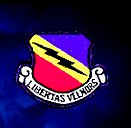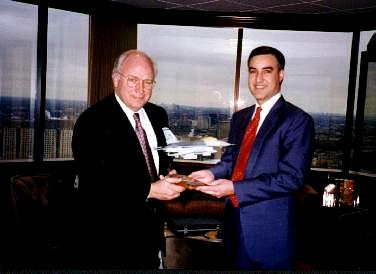 | |||
 | |||
 | |||
 | |||
FOREWORD by Dick Cheney
Dick Cheney with Keith Rosenkranz Keith Rosenkranz's Vipers in the Storm is a remarkable account by one of our outstanding pilots of what it was like to fly an F-16 jet fighter plane
in Desert Shield and Desert Storm. His story, based on thirty combat missions over Iraq and Kuwait, is an excellent portrayal of the tremendous skill and dedication of the men and women of today's U.S. Air Force. It also shows the human side of battle from a serviceman's point of view. One of my most memorable moments of Desert Storm was an afternoon that General Colin Powell and I spent in Saudi Arabia with a group of our
pilots, who had been flying missions over Kuwait and Iraq during the air war, prior to the beginning of the ground campaign. It was an unforgettable event because of the immediacy of their combat experiences, and because they were able to give us firsthand accounts of the effectiveness of American air power. I also remember the day we welcomed home the troops of Desert Storm with a parade down Constitution Avenue in Washington, D.C. It was a grand and glorious
occasion, as a grateful nation expressed its thanks to the thousands of servicemen and women who brought us one of the most decisive victories in military history. But before the parade, there was a memorial service at Arlington National Cemetery for those who had paid the ultimate price for that victory. At the end of the service, a group of aircraft passed over Arlington in the "missing man" formation. I will never forget the tragic,
stricken faces of the families of those who were killed in action. Reading Captain Rosenkranz's account of his experiences rekindled all of those memories for me - the pride we all felt in the accomplishments of our armed forces, and the sense of despair over the loss of those who sacrificed everything for our victory. "Rosey" (Keith's call sign) goes beyond his personal experiences and gives us a first-rate account of the performance of the F-16, and of the
grueling and demanding missions that convert young civilians into the world's finest pilots. His story will have readers "in the cockpit" as he recounts the performance of the combat systems of the F-16. Capt. Rosenkranz also captures the personal costs involved in military service. He relates the frustration that goes with the endless days of waiting for something decisive to happen. He describes the debilitating
impact on morale of not knowing what the future may hold, and the fears that are a natural part of contemplating combat for the first time. Vipers in the Storm accurately reflects the decisive role that the United States played in defeating Saddam Hussein's military and liberating Kuwait. It is a superb account of modern air warfare. Most of all, it is a reminder of how enormously fortunate we are that there are young
American's like Keith Rosenkranz able and willing to defend the nation. Dick Cheney
| |||
